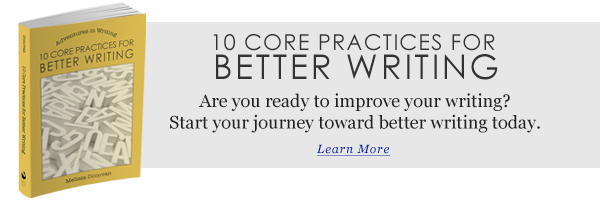Have you ever read a sentence and wondered what it was trying to say? Ever gotten hung up on a word that felt out of place because the meaning of the word didn’t fit the context? When was the last time you spotted a word that was unnecessarily repeated throughout a page, chapter, or book?
There are two sides to any piece of writing. The first is the message, idea, or story. The other side is the craft of stringing words together into sentences and using sentences to build paragraphs. Adept writing flows smoothy and makes sense. Readers shouldn’t have to stop and dissect sentences or get hung up on words that are repetitive or confusing.
Which is why word choice is such an important skill for any writer to possess.
Common Word-Choice Mistakes
The right word can make or break a sentence. If we want our prose to be rich, vibrant, and meaningful, then we need to develop a robust vocabulary. As we write, revise, and proofread, there are plenty of common word-choice mistakes to watch out for. If we can catch those mistakes and fix them, we’ll end up with better writing.
Here are some word-choice to mistakes to watch out for in your writing:
Repetition: When the same words and phrases are repeated in a short space, they act like clichés, becoming tiresome and meaningless. Some words have to be repeated, especially articles, prepositions, and conjunctions. If we’re writing a story set on a submarine, the word submarine (or sub) will get repeated frequently. That’s to be expected. However, repetitive descriptive words get monotonous. Every girl is pretty, every stride is long, everybody taps their keyboards. The fix: look for words that can be replaced with synonyms or alternative wording and avoid using the same descriptive words over and over again.
Connotation: With all the synonyms available, choosing the right word can be a challenge. Each word has a meaning, but most words also have connotations, which skew the meaning in a particular direction. Connotations are implied or emotional undertones that flavor a word’s meaning. If your character is going home, there is a much different implication than if the character is going to her house. The fix: when choosing synonyms, consider the connotation and emotional flavor of each option.
Precision: The best word choices are specific. One word might be vague and nondescript while another is vivid and descriptive. Consider the following sentences:
He wrote a poem on a piece of paper.
He wrote a poem on a sheet of vellum.
The second sentence is more visual because the word choice (vellum) is more precise. The fix: whenever possible, choose the most precise word available.
Simplicity: Readers don’t want to have to run to the dictionary to get through a page of your writing, and most don’t appreciate the haughtiness that erudite writing evokes. If you’re writing to a highbrow audience, then by all means, feel free to pontificate, but to reach a wider audience, make your language accessible. The fix: check your text for rare and long words, and if you can replace them with more common or shorter words, do it.
Musicality: Sometimes, word choice comes down to musicality. How does one word sound in your sentence as opposed to another? If you’re trying to choose between words like bin and container, you might make your decision based on which word sounds better in the sentence. The fix: read sentences and paragraphs aloud to see how different words sound.
Thoughtful Word Choices for Better Writing
Whether you agonize over word choice while you’re drafting or during revisions, there are some incredibly useful tools for making word choice a breeze. In addition to using the tools that are at your disposal, consistently working to expand your vocabulary will do wonders for improving your language and word-choice skills:
- The thesaurus and the dictionary are your friends. Use them (especially the thesaurus).
- Read voraciously. Nothing will improve your writing and your vocabulary as well as the simple act of reading.
- Read and write poetry. Poems are full of vivacious words. You’ll develop a knack for word choice and grow a bountiful vocabulary if you study a little poetry.
- Play word games like Scrabble, Scattergories, and Words with Friends, which force you to actively use your vocabulary.
- Sign up for Word of the Day and commit to learning 365 words over the next year.
Have you ever gotten frustrated by reading a book that was peppered with poor word choices? Do you make a conscious effort to use the right words in your writing? How far will you go to find the perfect word for a sentence? Share your thoughts on how thoughtful word choices result in better writing by leaving a comment, and keep writing!






Thanks so much for this article. Though I actually did a few semesters of grad school, I still easily get caught up in several of the traps you mentioned. Nothing like a good guide in front of you to help you out.
Sometimes I get so caught up in writing a scene or conveying a particular message that I forget to think about word choice. That’s why I’m so glad I always get a chance to revise my work.
@Melissa Yes I have read plenty of sentences that I had to read over and over and over again, simply to crack the case of what it was attempting to say. As a reward, this has made me very aware of how critical word choice is. That is why I am so eager to improve my writing skills. In addition to not knowing the basics (what conjunctions and prepositions are), I could really use a lesson or two in word choice, descriptive writing, and an expansion in my vocab. I have supposedly been expanding my vocabulary for a while now, until I realized it could not be done without reading (misunderstanding the syntax and vocab; just to name a few reasons why I absolutely hate reading). So, I began to read, and I find myself hung-up on what I view to be very basic words, and it annoys the crap out of me. I have signed up for the word of the day on dictionary.com, but it seems that it goes through one side of the brain, and right out the other side that doesn’t care to process language. Lol! At the very most, I’ll recall having it as a word of the day, when I see it written in a book somewhere. I will not remember the definition. Strengths: repetition; simplicity; and musicality. Weaknesses: Have never given connotations any consideration. .just the denotative (underlying meaning); and precision (what I like to refer to as descriptive/visual writing). Please help! What are other ways can I expand my vocab and unlock the doors on the cell gate, that holds my creativity in captivity? As some would call it, “I would love to have my ‘creative juices’ flowing.” Thank you, in advance!
My suggestion is to keep a vocabulary journal. Keep reading and when you come across a word you don’t know, write it down in your vocabulary journal along with the definition. Then, once a week or once a month, read through the latest entries. I like word-of-the-day too, but the words are usually rare ones that don’t get used often. My other suggestion is to read poetry. It will do wonders for your vocabulary and learning about the nuances of word choice. Sound and Sense is a bit pricey but it’s my top recommendation for learning words and literary devices. Good luck to you!
This was very helpful and updated, I have two books I use which are also great; Writer’s First Aid By Kristi Holl and On Writing Well by William Zinsser. Both are available at amazon.com; however, I plan on subscribing here right after this post is successfully processed. This is a wonderful tool for all writers searching for ways to improve their craft.
Thanks, Robin, for your book recommendations and for subscribing. Keep writing!
Could I just hug you, Melissa? #HUGSSS
I am grinning WIDE after reading this ah-mazing post! Words seduce, strengthen and stimulate me, and hence I am committed to honing my writing skills.
I do have a Word a Day blog wherein I post an eclectic collection of words – some easy, some hard, some musical, some plain, some common, some uncommon – not every word can be used in our daily lives, but it gives me great joy to share my love for words with everyone!
Thank you so much #HUGS
Much love
Kit
Hi Krithika,
Thanks for your kind words. I’m glad you enjoyed this post. Words can be magical and fascinating, and they are the building blocks of our craft, so it’s important for us to embrace them. Keep writing!
This is beautiful. I constantly tell people all the time word economy is one of the most important things in writing. If you can say it in a simpler and more visual manner,your readers will love you for it. I think the importance of the word choice and structure isn’t just about what’s being said but also momentum. People try to make things sound so poetic all the time which either 1) bores the reader if done incorrectly or 2) confuses them. That is why I try to write simple yet powerful sentences by choosing the correct words.
Logan, I agree one hundred percent! Even in poetry, word economy usually leads to a more compelling piece than a lot of excessive, unnecessary language, which only serves to weigh down the text.
There is a word (a single word, not a phrase, not the word diction) that means to agonize over word choice, but I have forgotten this word. Does anyone here know this term. Thank you in advance.
I’m not sure, but you might try Google or the thesaurus.
Great tips! Sharing…
Thanks, Bette!
Melissa, I totally agree with you on this article. Building an extensive vocabulary has had a huge effect on my writing ability. In the beginning stages of my craft, I struggled with finding the right words to enhance the narratives in the stories I wrote. I have to admit that in those days I encountered the most strenuous growing pains ever. Fortunately, those times are no more and I can say that I am grateful for rising to the occasion. Thank you for sharing this post.
You’re welcome, Derrick. I’m glad you found this article worthwhile.